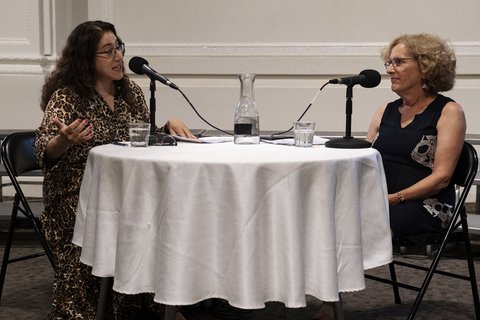
13 Jul Governments Can Gatekeep Public Information. A Veteran Journalist Explains Why and How to Champion Democracy

San Francisco Public Press publisher Lila LaHood talks government secrecy with reporter Miranda Spivack at the Kanbar Performing Arts Center in San Francisco on Thursday. (Yesica Prado / San Francisco Public Press via Bay City News)
By Cameron Fozi
Bay City News
In a Thursday night talk with San Francisco Public Press publisher Lila LaHood, veteran journalist Miranda Spivack discussed government secrecy, a practice for which many local authorities have a growing penchant.
Currently a freelance reporter for the New York Times and other publications, Spivack has spent much of her career chronicling how governments gatekeep or conceal public records. Some of that reporting has appeared in Reveal as “State Secrets,” an investigative series awarded the Sunshine Award by the Society for Professional Journalists in 2017, and in her 20 years at different Washington Post publications.
In the talk, Spivack discussed her forthcoming book “Backroom Deals in Our Backyards: How Government Secrecy Harms our Communities – and the Local Heroes Fighting Back,” took questions on government secrecy and suggested how both governments and the public can champion transparency.
“Every state has a public records law,” Spivack said. “But they’re not really being enforced.”
LaHood and Spivack both lamented the often-cumbersome process of requesting records from governments, despite laws at the federal, state and local levels which promote transparency.
Spivack referenced her ongoing records request from the U.S. Department of Agriculture, which she said has gone on more than three years. In 2023, the agency took an average of approximately 23 days to process simple records requests and about 221 days to process complex requests, according to data from the federal Freedom of Information Act website.
Local governments, Spivack added, can prolong such requests if they have not yet digitized the records or if employees cannot locate them.
Other times, Spivack added, governments avoid requests for public records by citing privacy issues or trade secrets exemptions. For example, a government may dodge a public records request if its third-party contractors possess the information, she said. If the record is involved in some investigation, Spivack added, the government may also decide to withhold it.
Spivack’s upcoming book, she said, also tells the stories of people who — in tackling government secrecy and problems in their communities — stood up to the interests of private industry.
One of those five is Diane Cotter, who discovered that some firefighting gear contain per- and polyfluoroalkyl substances, or PFAS. According to the National Institutes of Health, research has linked PFAS to increased risk of cancers, weakened immunity and altered metabolism.
Cotter’s discovery, Spivack said in a prior interview, came after years of urging government officials and union leaders to investigate the potentially toxic gear and collaboration between private industry and government to keep PFAS-tainted gear a secret.
“One of the biggest problems is that people don’t trust government,” Spivack said. “Governments, state and local in particular, can be a lot more open.”
To promote transparency, Spivack suggested that governments make better use of technology by holding meetings over Zoom and publishing the recordings. And though making public records more accessible would be “not inexpensive,” she said some may contend that governments could save money on fulfilling records requests if they made such records more accessible.
Spivack also shared tips to help the public in their requests for public records. Aside from keeping requests specific and explicit, she suggested calling government agencies by phone, showing up in-person to request records or even casually asking government employees for records outside a formal request.
“It’s hard to do this work when I’m a journalist, and I know how to file public records requests,” Spivack said. “But most people don’t have that information.”
The San Francisco Public Press also recorded the talk for later broadcast on its radio station KSFP 102.5 FM, said Lisa Rudman, development director for the Public Press.
Copyright © 2024 Bay City News, Inc. All rights reserved. Republication, rebroadcast or redistribution without the express written consent of Bay City News, Inc. is prohibited. Bay City News is a 24/7 news service covering the greater Bay Area.






No Comments